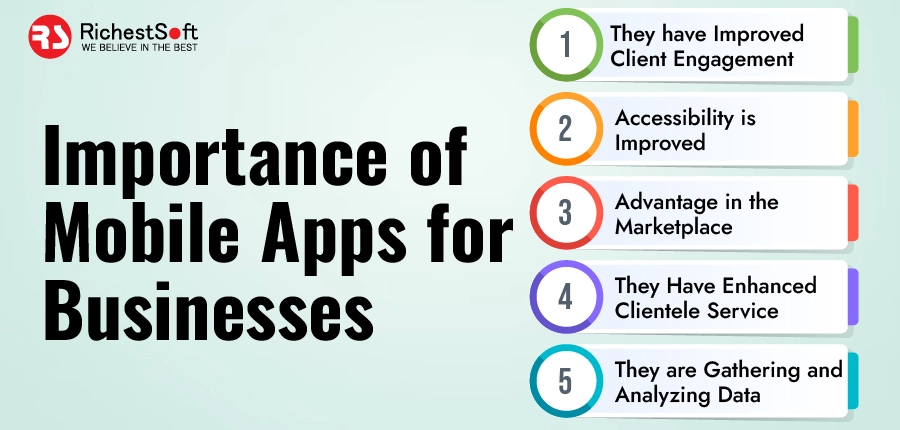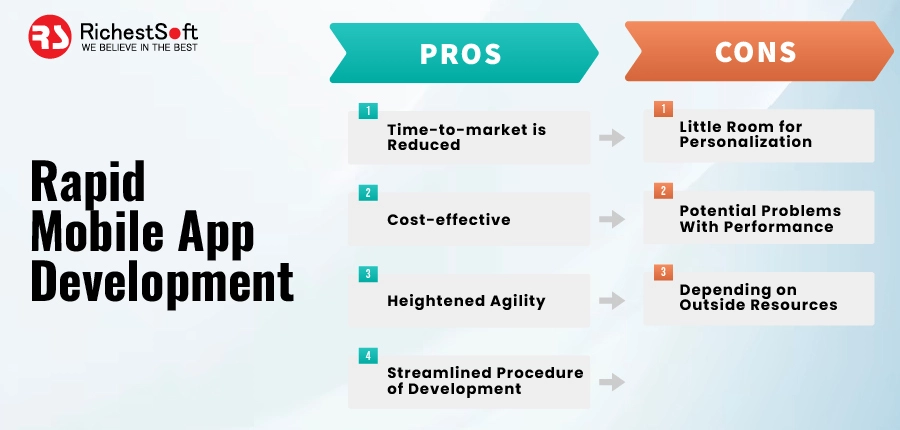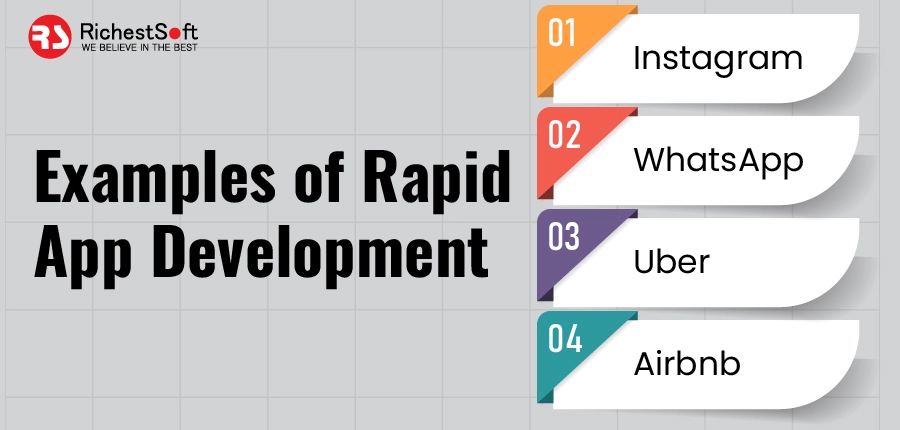Mobile apps have assimilated into our everyday lives in today’s fast-paced digital world. Mobile applications provide efficiency and convenience at our fingertips, allowing us to do anything from place restaurant orders to book cabs and manage our money. Businesses are continuously looking for ways to create and launch mobile apps fast to satisfy customer expectations as the market for mobile applications rises.
Rapid Mobile App Development (RMAD) enters the picture in this situation. This article will define RMAD, discuss its significance for businesses, and go into its advantages and disadvantages. We will also give real-world instances of effective quick app development to illustrate its usefulness.
What is Rapid Mobile App Development?

As the name implies, rapid mobile app development is a strategy that emphasizes accelerating your mobile app development procedure. It entails utilizing devices, platforms, and methods that quicken the app development process, allowing organizations to release their Apps more quickly than conventional development techniques.
RMAD attempts to speed up development and cut expenses while preserving the application’s features and reliability.
Overall Rapid Mobile App Development (RMAD) methodology aims to hasten the production of mobile apps. It accelerates the creation of functional, valuable applications by using resources, buildings, and procedures. RMAD frequently uses low-code or no-code platforms, which require little to no programming and speed up and improve the creation process.
Developers, creators, and business partners often work alongside one another in RMAD to produce apps that satisfy both the demands of consumers and the company’s demands. With this strategy, developers can quickly refine and modify the app in response to user input and market patterns.
Importance of Mobile Apps for Businesses

Across all industries, mobile applications have become a crucial tool for organizations. They provide assets of advantages and are essential for raising consumer engagement, boosting sales, and contributing to total business success. Here are a few main arguments in favor of mobile applications for companies.
✅They Have Improved Client Engagement
Businesses may communicate with their clients directly and specifically using mobile apps. Companies may communicate directly with their consumers and forge deeper bonds with features like push alerts, in-app communication, and tailored content. Retention and loyalty to customers rise as a result of this improved interaction.
✅Accessibility is Improved
Customers may reach companies through mobile applications anytime and from any location. Users may readily access applications on their smartphones thanks to the growing usage of cell phones, which enables companies to provide services, goods, and support while customers are on the go. This accessibility considerably increases the simplicity and contentment of customers.
✅Advantage in the Marketplace
Having an application for mobile devices may provide you with an essential competitive edge in today’s fiercely competitive industry.
Businesses may utilize apps to stand out from rivals, highlight their distinctive offers, and deliver a smooth and individualized customer experience. Companies may draw new clients and keep their current ones by remaining afloat with trends and providing a mobile app.
✅They Have Enhanced Clientele Service
Businesses may provide self-service alternatives and rapid Android development access to data with mobile applications, enhancing the entire consumer experience. Customers can quickly read FAQs, monitor orders, view product information, and get real-time help through in-app messaging or chat. These functions raise customer happiness, cut down on support expenses, and open up time to handle trickier client queries.
✅They are Gathering and Analyzing Data
Businesses may collect and analyze various data from mobile applications to learn essential details about user habits, tastes, and statistics. Making educated judgments, improving app performance, customizing user interfaces, and even finding new business prospects may all be done with the help of this data. Businesses may continuously enhance their apps and match their strategy with customer wants by utilizing the power of data.
Table of Pros and Cons of Rapid Mobile App Development

| Pros | Cons |
|---|---|
| Time-to-market is reduced – The time needed to design an app is considerably shortened with RMAD, enabling firms to release their apps more quickly. | There is little room for personalization. Tools for developing apps could have fewer customization choices. |
| Cost-effective – Companies can more effectively deploy resources since it reduces the need for lengthy testing and development. | Potential problems with performance. The functionality and reliability of the app may occasionally be compromised by the requirement for speed in quick app development. |
| Heightened Agility. Businesses can swiftly adjust to shifting consumer needs thanks to RMAD. | Depending on outside resources. RMAD frequently uses software and frameworks from other sources, which might introduce vulnerabilities and security vulnerabilities. |
| Streamlined procedure of development. Creating functional applications is made simpler for developers by the prevalence of ready-made templates and elements in rapid Android development tools and platforms. | |
Some Examples of Rapid App Development

Sure! Here are a few illustrations of mobile applications that employ quick app development techniques.
✔️Instagram – Instagram was first created by applying a quick app development methodology, and it is a well-known social networking network for sharing images and videos. The characteristics of the application were swiftly developed and improved by the team using an assortment of low-code instruments and continuous improvement, which contributed to its speedy expansion and widespread acceptance.
✔️WhatsApp – Rapid Android development methods were also employed in creating WhatsApp’s well-known messaging application. The design team developed a user-friendly networking system that enables text, audio, and video communication using agile approaches and fast prototyping.
✔️Uber – Uber, an online service for ride-sharing and meal delivery, used fast app development techniques to create a scalable and trustworthy mobile application. To guarantee a flawless user interface and effective execution of services, the team used low-code technologies and ongoing testing.
✔️Airbnb – Airbnb, a well-known digital marketplace for hotels and lodgings, developed rapid Android development methods to build an intuitive platform. The team used agile approaches and incremental design to extend the platform to handle an increasing user base, swiftly add new features, and enhance user experiences.
Tools Used in Rapid App Development

The rapid and effective creation of mobile apps is made possible by a range of resources, platforms, and concepts used in rapid mobile app development (RMAD). These applications enable programmers to speed up app creation by providing features like drag-and-drop designs, pre-built blueprints, low-code, and no-code functionality. Here are a few standard tools for quick app creation.
👉Alpha Anywhere
With the help of the comprehensive low-code coding system Alpha Anywhere, programmers may quickly produce cross-platform mobile applications. It has a graphical user interface, strong database management skills, and integrated security measures. Data coordination, offline capabilities, and connection with different back-end systems are all supported by Alpha Anywhere.
👉Flutter
Flutter is a Google-developed open-source software development kit that relies on the programming language Dart. Flutter SDK additionally serves the demands of huge organizations but also smoothly fits into the startup ecosystem due to its cost, production speed, and a wide array of features. Flutter, among the most popular app development systems, supports designing apps for Android or iOS simultaneously, just like React Native.
A unique feature called “Hot reload” enables programmers to render updates quickly, immediately causing changes to appear on the UI. Allows for the opportunity to find and fix issues throughout the development cycle.
Complex widgets may be created and modified to suit the application’s requirements.
You can use written Swift, Java, and Objective-C code to exploit native features like the camera and location. Because Google Firebase provides back-end assistance, developers are more confident in their ability to create scalable apps.
👉Appery.io
A visual framework for development is offered by the online platform Appery.io for creating mobile and flexible web apps. It includes a drag-and-drop experience, integration with back-end solutions, and pre-built graphical elements. Cooperation, real-time previewing, and seamless connection with well-liked programming frameworks, including AngularJS and Bootstrap, are all supported by Appery.io.
👉Buzztouch
A free platform called Buzztouch utilizes to create native applications for both iOS and Android. It provides a web-based system for managing content (CMS) that allows designers to alter the appearance and features of the app. Buzztouch offers a range of extensions and plugins for attributes, including push messaging, GPS services, and social network connectivity.
👉Use React Native
React Native represents an open-source mobile programming tool made by Meta that aids in building JavaScript-based apps for Android and iOS. It is an excellent rapid mobile app development. Using React Native, you may create a new program or upgrade a current one having a single code foundation. Additionally, it can aid in the innovation of native applications, which are often quicker and perform better than hybrid programs. The rapid prototyping and user-friendly design of React Native are two of its best advantages.
Facebook introduced it in 2015, and it has gotten progressively better. Ask any reputable software development business today, and you’ll likely learn they use React Native. React Native has established itself as one of the best tools for developing mobile apps by being used by household companies like Facebook and Uber.
👉Mobile Frame
Mobile Frame, a free framework for mobile application development, facilitates business-grade smartphone application manufacturing. It provides an interactive design workspace, ready-made plans, and seamless connection with a combination of back-end applications, notably databases, APIs, and business applications. Mobile Frame supports offline functionality, data syncing, and also safe identification.
👉Xamarin
With the help of the remarkable cross-platform programming framework Xamarin, programmers create native mobile apps employing C# and .NET. It provides a rich development environment, using platform-specific application programming interfaces and a single application. Xamarin facilitates code exchange between Windows, iOS, and Android systems and skillfully interacts with Visual Studio.
👉An Android Studio
Google’s tool for building Android-specific apps enables programmers to include sophisticated functionality. Using Android Studio, you can rapidly develop app structures and designs and have access to a wealth of tools to make the most of various capabilities. Because it is Google’s authorized integrated building surroundings, this tool provides improved stability, safety, and speed, which is why several developers of Android apps choose to use it. The drag-and-drop method, straightforward interface, and accessibility features of Android Studio make it incredibly simple to use.
👉Framework 7
Applications for the iPhone are made natively using Framework 7. However, they have lately begun offering help to Android applications. This free, open-source phone HTML framework constructs native apps more quickly. Consequently, a reputable Apple app design business uses Framework 7 for all mobile app development initiatives.
FAQs
Q1: Does applying RMAD tools need coding expertise?
Ans: Although coding skills are not always necessary, having a basic comprehension of programming ideas for tweaks or more sophisticated features can be helpful. However, many rapid mobile app development solutions provide user-friendly interfaces and graphical development platforms that let users construct apps without requiring a lot of code.
Q2: Can RMAD tools be used to keep up with the apps?
Ans: Yes, having the capacity to iterate and refresh apps rapidly constitutes one of the benefits of RMAD. Most RMAD platforms include smooth update methods that let organizations send upgrades via their applications without interfering with user experience. The development team can effectively handle maintenance and upgrades since these technologies frequently take working together.
Q3: Can RMAD tools handle complicated corporate applications?
Ans: Yes, adequate RMAD technologies are enhanced to handle sophisticated business applications. They provide integration with different files, back-end platforms, and features for enterprise-level security. Large datasets, offline functionality, and sophisticated business logic are all qualities these technologies have to meet the demands of corporate applications.
Q4: Are applications developed with RMAD technologies as reliable and feature-rich as conventionally coded programs?
Ans: Due to substantial development over time, RMAD tools now offer various capabilities and features. Even while they might not provide as much flexibility and fine-tuning compared to conventional coding, RMAD solutions can be used to build strong, full of features apps that are suitable for most enterprises.
Conclusion
Rapid Mobile App Development (RMAD), which offers rapidity, productivity, and adaptability, has revolutionized how firms produce mobile apps. Businesses may build viable and feature-rich programs in less time with the help of minimal code, even no-coding systems, and cooperative development processes, thereby increasing consumer engagement, generating income, and obtaining a competitive edge.
It is impossible to exaggerate the value of mobile applications for companies. Mobile applications provide –
- Business direct client contact.
- Enhanced client service.
- More accessibility.
- An edge over the competition.
- Insightful data.
Businesses may use the potential of mobile applications to improve their brand visibility, foster client loyalty, and increase revenue if the proper tactics and strategies are in place.
The rapid Android development tools come in a wide variety to meet several needs and tastes. Corporations can select the tools that best suit their demands for development, ranging from no-coding options like App Press along with AppGyver to simple code with little code, including Alpha Anywhere alongside OutSystems.
Adopting RMAD and utilizing the appropriate technologies will be crucial for organizations to stay forward in the age of the Internet as the app development environment continues to change. Businesses can unleash the full power of mobile devices, spur innovation, and provide fantastic customer service by using a quick and agile strategy for building apps.
 +1 315 210 4488
+1 315 210 4488 +91 798 618 8377
+91 798 618 8377


